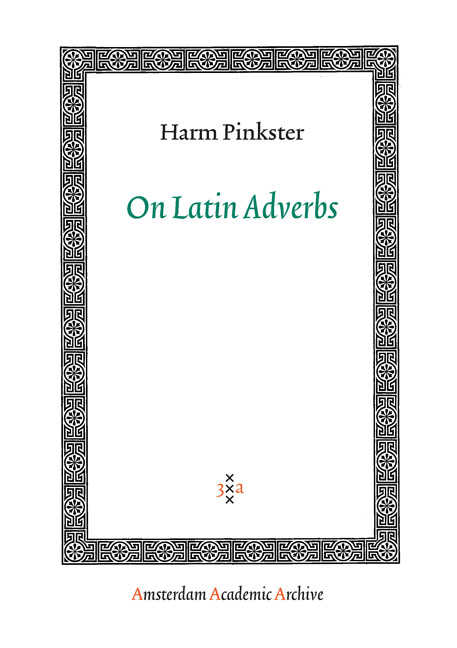Book contents
- Frontmatter
- Preface to this Edition
- Preface
- Contents
- Introduction
- 1 General Problems of Studying a Dead Language
- 2 Problems of Classification
- 3 Adverbs in Roman Grammatical Theory
- 4 The Adverb in Latin Linguistics
- 5 Adverbs as Derived Forms
- 6 Syntactic Problems
- 7 Subclassification of Adverbs
- 8 Adverbs and other Invariables
- 9 The Relationship Between Adverbs and Prepositions
- 10 Adverbs and Connectors
- 11 Adverbs and Subordinators
- Bibliography
- Indices
- Index Auctorum
- Titles Published in the Aaa Series
5 - Adverbs as Derived Forms
Published online by Cambridge University Press: 24 January 2021
- Frontmatter
- Preface to this Edition
- Preface
- Contents
- Introduction
- 1 General Problems of Studying a Dead Language
- 2 Problems of Classification
- 3 Adverbs in Roman Grammatical Theory
- 4 The Adverb in Latin Linguistics
- 5 Adverbs as Derived Forms
- 6 Syntactic Problems
- 7 Subclassification of Adverbs
- 8 Adverbs and other Invariables
- 9 The Relationship Between Adverbs and Prepositions
- 10 Adverbs and Connectors
- 11 Adverbs and Subordinators
- Bibliography
- Indices
- Index Auctorum
- Titles Published in the Aaa Series
Summary
In this chapter I will discuss the question of how we can best account for the fact that the majority of adverbs are related formally and semantically to words belonging to the classes of adjectives, nouns, pronouns and verbs. In principle two solutions are possible:
(1) adverbs are ‘forms of adjectives, nouns, etc. The implication of this solution is that adverbs do not constitute a word-class of their own (are a pseudo-category, as Bergsland (1940: 53) puts it). On ‘form or see 2.2.2. (2) adverbs are related to adjectives, nouns, etc., but cannot be regarded as forms of them.
In the first solution adverbs are inflected forms, in solution (2) they are uninflected or, in other words, invariable. The formal resemblance is based. on a’ derivational relation. If they are regarded as uninflected, it is not immediately clear how comparative and superlative adverbs are to be described. Should we speak about comparative and superlative forms of adverbs or about adverbs related to comparative and superlative adjectives?
In the traditional view it is held that the adverbs meant here are derivationally related to adjectival, nominal, pronominal and verballexemes (or in traditional terminology: are derived from the stems of adjectives, nouns, etc.). It has been suggested, however, from ancient times onwards, that adverbs are not essentially different from inflected forms. Thus the idea that adverbs are words in the ·'adverbial case’ has been maintained by Chrysippus according to Steinthal (1890: I, 302; criticism in Calboli 1971: 115-22). It has received the approval of Hjelmslev (1935: 4).
The discussion on the advantages of the inflectional view over the derivational view has been focused on the relationship between adjectives and adverbs. As such the problem is relevant for modern languages as well.! Bergsland (1940), however, takes adverbs related to the other classes mentioned, into account, too. Three different versions of the inflectional view occur. The first views adverbs and adjectives as forms of the same lexeme, the second regards adverbs as constructed from adjectives by the addition of an empty morpheme, the third regards all four types (adjectival, nominal, etc.) as adverbial case forms.
Adverbs and adjectives are both forms ofone lexeme
In the inflectional view it is held, of course, that adverbs can be accounted for by the constructions which the lexemes they realize enter into.
- Type
- Chapter
- Information
- On Latin Adverbs , pp. 63 - 70Publisher: Amsterdam University PressPrint publication year: 2005



